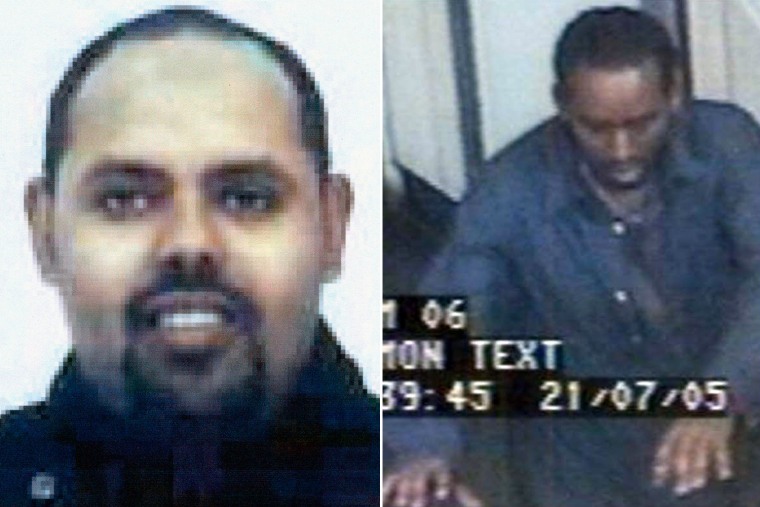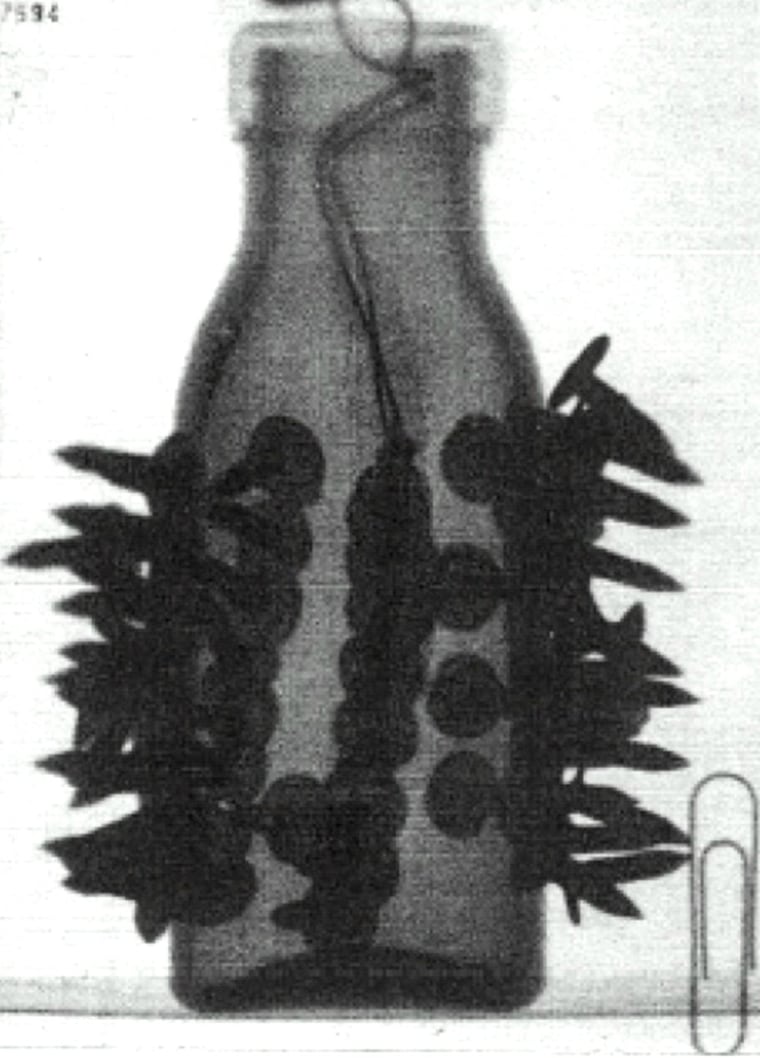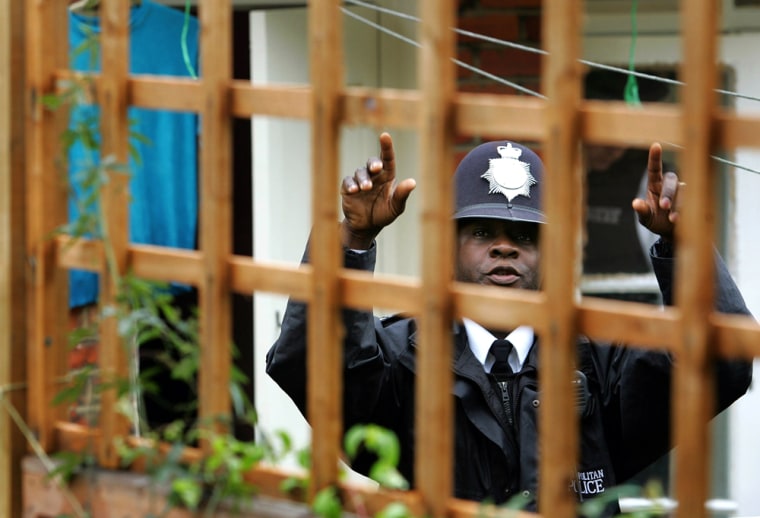A man wanted for questioning in the London bombings and who is also wanted in the United States has been arrested in Zambia, senior U.S. officials told NBC News.
Haroon Rashid Aswat, a British citizen of Indian descent, was arrested several days ago, the officials said, and has been questioned by British and U.S. investigators who traveled to the African country. He was arrested by Zambia after authorities there were apparently tipped off by British authorities, one U.S. official said.
Investigators discovered Aswat had made about 20 calls from his cell phone to some of the four men who set off the bombs in London's July 7th attack before they killed 52 people and themselves.
Aswat also is wanted in the United States as an unindicted co-conspirator in the attempt by al-Qaida sympathizers to explore starting a training camp in Oregon. He is alleged to have helped scout out a property in 1999 and 2000.
He’s also said to be named in a federal indictment, currently under seal, filed by prosecutors in New York.
The officials stressed no evidence exists to tie Aswat to the London bombings. “He has moved in bad circles, but his particular role in these bombings remains unclear,” one official said.
U.S. and British officials are in talks with Zambian officials to determine where to prosecute Aswat.
Connected to other bombers
Aswat reportedly grew up in the same area of Northern England as three of the July 7 bombers. He has been described by U.S. law enforcement as an emissary of Abu Hamza al Masri, a radical Muslim cleric living in London.
According to documents from 2000, Aswat lived at the now-defunct Dar-us-Salaam Mosque in Seattle, where he "expounded on the teachings and writings" of Abu Hamza and helped Abu Hamza plan building a terrorist training camp in Bly, Ore.
On visits to New York, Seattle and Oregon, Aswat bragged about being Osama bin Laden's personal "hit man." He said he had been sent to America to prepare future militants for attacks in the United States.
For reasons unknown, the Oregon camp never came to fruition, and Aswat returned to London. Afterward, he allegedly traveled to Pakistan and Afghanistan, attending an Al-Qaida training camp in the latter.
In London, meanwhile, anti-terrorist officers arrested nine men Thursday in raids in connection with the botched July 21 attacks on London's transit system, bringing to 20 the number of people police have in custody, including one of the alleged bombers.
Biggest U.K. operations since World War II
With three of the suspected attackers still at large, Britain has launched its biggest police operation since World War II, flooding the city with thousands of officers to reassure the public while also warning of more possible attacks.

Scotland Yard police headquarters said the nine men were arrested under the Terrorism Act at two properties in the neighborhood of Tooting, in south London.
The arrests follow a significant breakthrough on Wednesday, when authorities in the central England city of Birmingham arrested one of the four men suspected of carrying out the failed attacks — Yasin Hassan Omar, 24. He was being held Thursday at a top-security police station in London.
The three other bombers suspected of carrying out last week's attacks were still on the run, police said.
Peter Clarke, the head of London's police anti-terrorist unit, called Omar's arrest "an important development in the investigation." But he warned that the three remaining bombers still presented a danger.
Security upped for milestone day
Security was tight at many subway stations in central London Thursday — exactly three weeks after the July 7 attacks on three subway trains and a bus that killed 56 people, including the four suicide bombers. Thursday was also one week after the failed July 21 attacks.
London's police commissioner warned Thursday there could be more cells of would-be bombers at large.
"It does remain possible that those at large will strike again. It does also remain possible that there are other cells that are capable and intent on striking again," Ian Blair told a police authority meeting.
"They are not amateurs. They made one mistake, and we are very lucky," he said of the July 21 attackers.
Property raided
Residents in Tooting said police arrested three Turkish men from a fast-food restaurant selling halal burgers. Halal is meat from a herbivore slaughtered in a humane way, as Islam requires.
Raja Kumar, who runs a 24-hour convenience store next to the restaurant, said dozens of officers raided the property at 4:30 a.m.
"Police said to us, 'Stay inside,' and then they took away three people from the shop, a man aged about 45 called Ali who has been living there for two years and two younger men aged about 28 and 26," he said.
Six other men were arrested from a property in nearby Garratt Terrace, a street opposite the Tooting Broadway subway station.
Arrest could unlock bigger story
Omar, a Somali citizen with British residency, was arrested in a dramatic raid by dozens of anti-terrorist police and bomb disposal experts, some in heavy body armor.
Interrogations of Omar may be key to determining whether last week's failed attacks are linked to the July 7 bombings. Omar is suspected of trying to blow up the Warren Street subway station last Thursday.

Kati Stewart, 31, a health care worker who lives across the street from Omar in the Small Heath neighborhood of Birmingham, said she'd seen four men coming and going frequently over the past two weeks. "They would come at 2 a.m., and then when you looked in the morning, the car had gone," she said.
But Omar, a refugee from Somalia who came to Britain in 1992, generally attracted little attention in the diverse neighborhood, where residents of many ethnic backgrounds and faiths — Indian, Pakistani and Irish; Christian, Hindu and Muslim — say they live together peacefully.
ABC News, meanwhile, reported that British authorities investigating the July 7 attack had found 12 bombs and four improvised detonators in the trunk of the car of one of the suspected suicide bombers 35 miles outside of London five days after the deadly explosions.
Both NBC News and ABC obtained photos of one bomb — a glass bottle apparently packed with explosives and covered in nails that could be used as shrapnel.
Women held
Other raids were carried out Wednesday in south London's Stockwell district, where officers arrested three women on suspicion of "harboring offenders," and on two more London homes, where no arrests were made but forensic tests were conducted, police said.
A second July 21 suspect has been named as Muktar Said Ibrahim, 27, also known as Muktar Mohammed Said. He came to Britain in 1990 from Eritrea, his family said. He was granted residency in 1992 and British citizenship in September 2004, the Home Office said.
Said was part of a gang that carried out a series of muggings in the mid-1990s but qualified for early release in 1998, the British news agency Press Association reported. When he left prison, Said had a beard, had adopted Islamic dress and was very devout, Press Association said.
Police are also looking into whether Said attended the Finsbury Park or Brixton mosques in London, and whether he met shoe-bomber Richard Reid, who is serving a life sentence in a U.S. prison after a failed attempt in 2001 to blow up an airplane, the news agency said.
